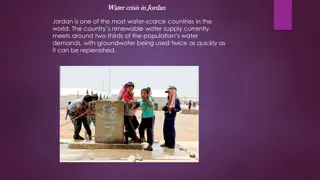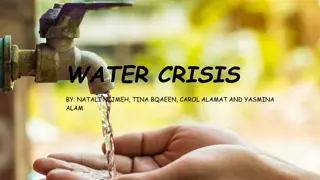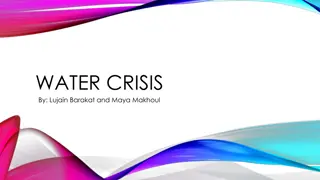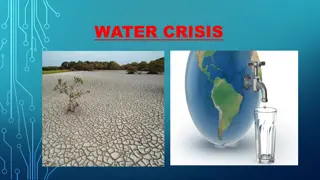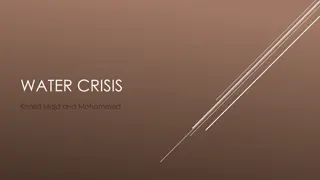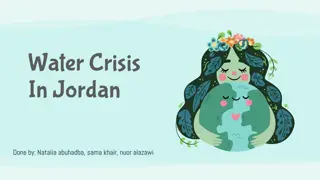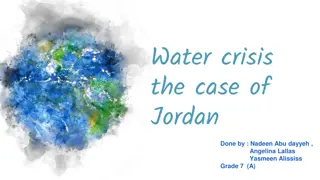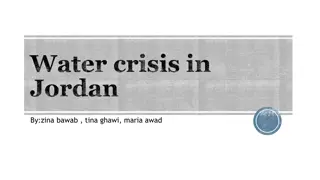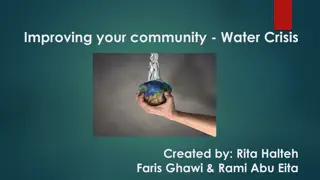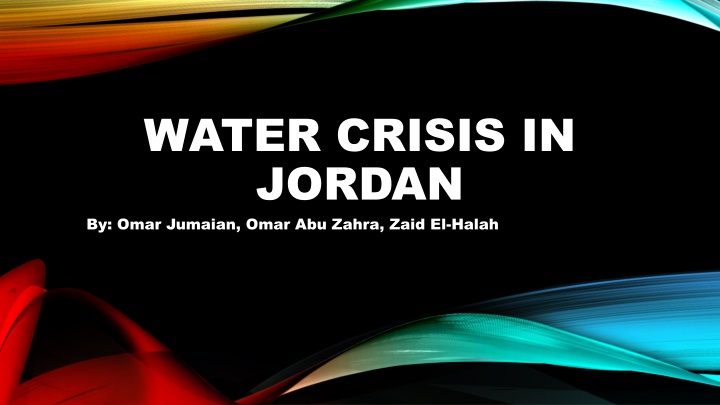
Water Crisis in Jordan: Causes, Consequences, and Solutions
The water crisis in Jordan is exacerbated by pollution, leading to contaminated water sources and scarcity. This article delves into the causes, consequences, and proposed solutions like desalination and recycling to combat the issue.
Download Presentation

Please find below an Image/Link to download the presentation.
The content on the website is provided AS IS for your information and personal use only. It may not be sold, licensed, or shared on other websites without obtaining consent from the author. If you encounter any issues during the download, it is possible that the publisher has removed the file from their server.
You are allowed to download the files provided on this website for personal or commercial use, subject to the condition that they are used lawfully. All files are the property of their respective owners.
The content on the website is provided AS IS for your information and personal use only. It may not be sold, licensed, or shared on other websites without obtaining consent from the author.
E N D
Presentation Transcript
WATER CRISIS IN JORDAN By: Omar Jumaian, Omar Abu Zahra, Zaid El-Halah
WHAT IS WATER CRISIS The quantity of water that is actually accessible varies as supply and demand shift. As demand rises and/or as the quantity or quality of the water supply is impacted, there is an increase in water scarcity. With about 100 m3 of clean water provided per person annually, Jordan is among the nations in the world with the smallest availability of water. For reference, the UN defines water shortage as having less than 500 m3 of water per person, a startling difference that is only widening.
WATER CRISIS CAUSES AND CONSEQUENCES Causes: Water problems are being made worse by pollution. Jordan's surface river sources are being contaminated by sewage system leaks, wastewater pumping station overflows, and exposure to commercial and industrial garbage. Water supplies have become contaminated with nitrate and phosphate as a result of this. Consequences: People cannot get enough water to consume, wash, or feed crops when there is a water shortage, which may result in economic loss. Additionally, poor sanitation, which affects 2.4 billion people, can result in cholera, typhoid fever, and other water-borne illnesses, including those that are fatal.
How to stop water How to stop water crisis crisis desalination of seawater. recycling and reuse of municipal wastewater. reuse is the construction of wetlands. These are some of the ways to stop water crisis in Jordan.
CONCLUSION CONCLUSION One of the countries with the lowest accessibility to clean water is Jordan. Currently, the nation's renewable water supply suffices to supply freshwater to around two-thirds of the population, with groundwater being utilized twice as rapidly as it can be replaced.
Water Resources & Environment: Basic page: Jordan. U.S. Agency for International Development. (2022b, August 16). https://www.usaid.gov/jordan/water-resources- environment#:~:text=Jordan%20is%20one%20of%20the,as%20it%20can%20be%20replenished. | N. A. A. (2023, February 6). Ways to counter water scarcity in Jordan. EcoMENA. https://www.ecomena.org/water-scarcity-jordan/ Water, sanitation, and hygiene. UNICEF Jordan. (2020, November 4). https://www.unicef.org/jordan/water- sanitation-and-hygiene

